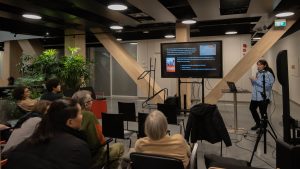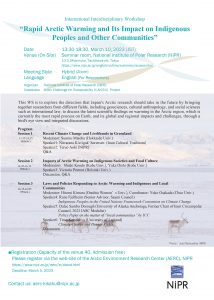 Invited talk by Victoria Peemot at the International Interdisciplinary Workshop “Rapid Arctic Warming and its Impact on Indigenous Peoples and Other Communities”, section “Impacts of Arctic Warming on Indigenous Societies and Food Culture”, moderators Associate Professor Shiaki Kondo and Associate Professor Yuka Oishi, Kobe University.
Invited talk by Victoria Peemot at the International Interdisciplinary Workshop “Rapid Arctic Warming and its Impact on Indigenous Peoples and Other Communities”, section “Impacts of Arctic Warming on Indigenous Societies and Food Culture”, moderators Associate Professor Shiaki Kondo and Associate Professor Yuka Oishi, Kobe University.
Abstract. My lecture explores the impact of climate change on food practices of mobile pastoralist households in the Altai-Sayan Uplands in North Asia. The focus is on multispecies communities which consist of pastoralist families and various species of domesticated animals: horses, reindeer, yaks, cows, camels, sheep, and goats. The domesticates are a base for subsistence: they are sold, exchanged for goods, used as a food source, and help in herding work. Leaning on ethnographic fieldwork with multispecies communities in the Altai and Sayan Mountains from 2015 to 2022, I discuss the pastoralists’ food practices which take into consideration a number of factors: animals’ condition in different seasons, cultural understanding of animals and animal products—meat and dairy, lack of access to energy sources, a landscape, and harsh continental climate in which people and animals live. The discussion draws attention to the current disruptions in the food-related practices, caused by and connected with global warming: drought, lack of snow, and a change in the seasonal variation characteristics of temperature, precipitation, and winds.
https://www.nipr.ac.jp/aerc/e/info/20230117.html
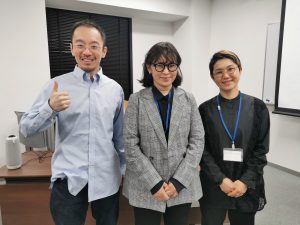 Shiaki Kondo, Victoria Peemot and Yuka Oishi, Tachikawa, Japan, 10 March 2023.
Shiaki Kondo, Victoria Peemot and Yuka Oishi, Tachikawa, Japan, 10 March 2023.


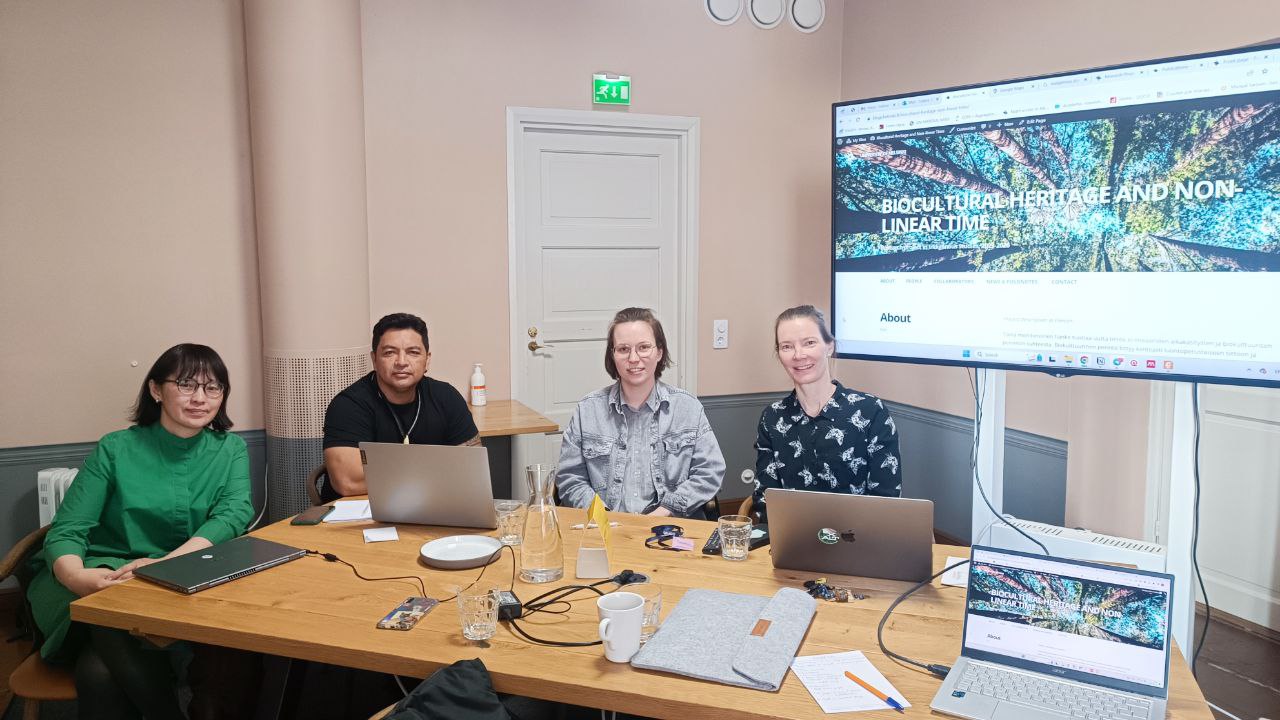
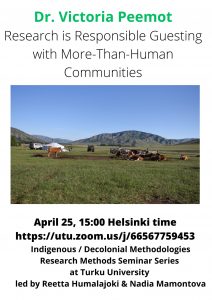 Victoria Peemot gave a talk in frames of a new seminar series “Indigenous / Decolonial Methodologies Research Methods” (led by Reetta Humalajoki and Nadia Mamontova) at the University of Turku, Finland.
Victoria Peemot gave a talk in frames of a new seminar series “Indigenous / Decolonial Methodologies Research Methods” (led by Reetta Humalajoki and Nadia Mamontova) at the University of Turku, Finland.
 Victoria Peemot gave a talk “A Kin, Adversary, and an Intermediary: the Wolf Among the Pastoralists in the Altai and Saian Mountains” at the AMI (Animals Make Identities) Zoom seminar series, University of Helsinki.
Victoria Peemot gave a talk “A Kin, Adversary, and an Intermediary: the Wolf Among the Pastoralists in the Altai and Saian Mountains” at the AMI (Animals Make Identities) Zoom seminar series, University of Helsinki.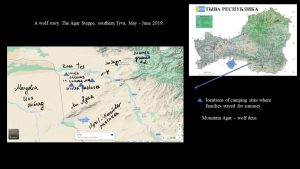 Mapping a wolf story @Victoria Peemot.
Mapping a wolf story @Victoria Peemot. Invited talk by Victoria Peemot at the International Interdisciplinary Workshop “Rapid Arctic Warming and its Impact on Indigenous Peoples and Other Communities”, section “Impacts of Arctic Warming on Indigenous Societies and Food Culture”, moderators Associate Professor Shiaki Kondo and Associate Professor Yuka Oishi, Kobe University.
Invited talk by Victoria Peemot at the International Interdisciplinary Workshop “Rapid Arctic Warming and its Impact on Indigenous Peoples and Other Communities”, section “Impacts of Arctic Warming on Indigenous Societies and Food Culture”, moderators Associate Professor Shiaki Kondo and Associate Professor Yuka Oishi, Kobe University. Shiaki Kondo, Victoria Peemot and Yuka Oishi, Tachikawa, Japan, 10 March 2023.
Shiaki Kondo, Victoria Peemot and Yuka Oishi, Tachikawa, Japan, 10 March 2023. Afternoon in the Science Basement” talk se
Afternoon in the Science Basement” talk se